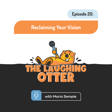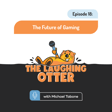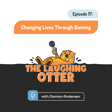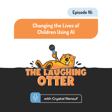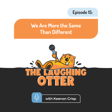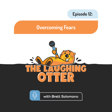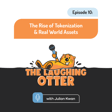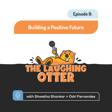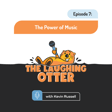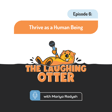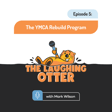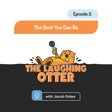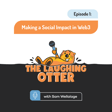Introduction to Michael O'Sullivan
00:00:07
Speaker
Hello and welcome to Otterly Positive Talks. We got a great guest on today, Michael O'Sullivan. He is a male high achievers coach with years of experience in this area. He works with high power movers, and he's got a lot of insight on making the most out of your life and how to be happy. Welcome to the show, Michael. Thanks for having me, Jeff. I'm really humbled to be here. Yeah, no, it's great to have you on the show because, um,
00:00:37
Speaker
personal well-being, mental health, happiness, achieving.
Mental Health Post-COVID
00:00:42
Speaker
It's really in line with all things The Laughing Otter. And it's always great to have somebody here on the show that has the expertise and a bit of knowledge in this space to help the listeners get the most out of their lives. So I got a question for you. We'll just start it right in the deep end. We're coming out of a post-COVID world.
00:01:07
Speaker
What are you seeing out there when you're talking to your clients, to some of these senior executives, politicians, actors, actresses? What are you seeing?
00:01:17
Speaker
To be honest, there's a really powerful question, Jeff, and it's a short answer really is there's a lot of struggle around mental health because I think that COVID really pushed people to become more exclusive and drawn back from people. So you're seeing a lot of social anxiety and people not wanting to go out as much, but also the higher mental health from mainstream media
00:01:45
Speaker
Obviously, we've been drummed in that we can't go out, we can't touch stuff. And I think this is really leading into our future generation because obviously what our kids are seeing, they're sort of growing up and doing as well.
00:02:01
Speaker
But definitely for the CEOs that I coach, the high stress of running all their teams at home, having to set up all the tech, I don't think many people have fully recovered. And obviously, this affects the mental health mindset, which affects the central nervous system. And it also starts to have an impact on sleep. And it's a bit of a snowball effect, as you get as you can tell. Yeah, I think when I look around, like,
00:02:28
Speaker
Um, I haven't done any scientific study on this, but I look around at all my mates and my, my wife and I, and even my, my son, the way I've termed it is we've all had the can't be bothered bone highly, uh, has grown in everyone. What used to be really fun things to do. I find myself fighting the urge to just say.
00:02:52
Speaker
Uh, I can't be bothered to go to the beach because I need to pack up everything and get it in the car. Or I can't be bothered to go watch the footy because I got to get everything together and get on a train where pre COVID it was, uh, look forward to it the night before you'd be all packed and ready to go. So, um, I, I'm definitely seeing that. So it's, it's, it's, it's interesting that you're seeing the same thing.
Strategies for Overcoming Challenges
00:03:17
Speaker
So to overcome some of these challenges, what do, what do you, um,
00:03:22
Speaker
How are you engaging with the people in your network and in your world and in your job to help them overcome these challenges? Well, I think because we had so much less social interaction, it's about just getting out and doing things because like getting out, especially in the sun, like one of the most powerful things we can do in the morning is
00:03:45
Speaker
take a positive breath as soon as you wake up and think something positive and futurecast something. But also get out in the sun and get outside and get sun on your skin. It's like we're made up of energy and our bodies are supposed to be outside and doing things outside. And when you get a lack of this, this leads to like lower energy because you're not getting the natural stuff like you need in the morning. But it also leads to that
00:04:13
Speaker
you know, lethargic feeling where you just don't feel like doing much. And like,
Gym Attendance and Mental Health
00:04:18
Speaker
I actually own a gym here in Newcastle, body beyond limits. And I noticed a lot of people sort of scattered off from from the gym, because they didn't want to be around many people. And it's, it's slowly coming back now. But I think the side effects from COVID are really something that's going to take many years for us to fix.
00:04:36
Speaker
for us health professionals that are on the front line. And to be honest, my motto at my gym is we don't say the C word, otherwise you do 10 burpees. And I think that the first thing you need to do is sort of take it out of your mind, because we know it's there now. It is one of those things like the flu, it's gonna be around. So like, I think the first thing we need to do is eliminate it from our minds, even though that social media has really drummed it into us.
The '3 M's' for Well-being
00:05:04
Speaker
and start doing really the three M's. My favorite M's is movement, like getting up and moving. That's going to give you more energy. Going out and doing stuff, being active. Second M word is mindset, like making sure you're keeping a positive mindset and future casting things that you want to achieve.
00:05:25
Speaker
And the third M word is meal times, like making sure you're grabbing the right foods. I noticed during the lockdown period that a lot of people are obviously using menu log and eating out and more delivery services because they're at home more. And this obviously led to a bit of an increase in people putting on weight and stuff like that, which increased their lethargic feeling and their lack of energy.
00:05:53
Speaker
Um, and it's sort of coming out of this little rod of, you know, getting back out there into society. But I think definitely like having the positive thought, not thinking about the word COVID and just getting out
Influence of Habits on the Next Generation
00:06:05
Speaker
and moving your bodies. Um, one of the things you should do. And I think for, for parents out there, especially parents listening, you know, we want to show our kids, our future, um, generation, like the domino that we're passing on good, healthy habits. So.
00:06:20
Speaker
making sure we're getting out to doing stuff and going to the beach and being active and just showing the future generation that they don't have to be scared or have social anxiety or anything. Yeah, it's all great points and something that really hit home with me was the get out in the sun. I grew up in Northern Ontario in Canada.
00:06:48
Speaker
Um, and then I lived in Toronto for eight years before I moved to Australia. And from like started December to end of March, you, like it's, it's dark, um, till eight or nine in the morning and it gets dark at four or five in the afternoon. Um, Toronto was built on a labyrinth of, of tunnels. So you can literally leave your, your apartment building, get on the subway, get off the subway, walk underground to your,
00:07:18
Speaker
to your place of work come up and you literally do not see the sun for five months. And when that first nice day end of March, early April hits, you just see people just flood the streets and you can feel millions of people, just this collective of veil just lift and it's not,
00:07:45
Speaker
It's very real when you experience it year in and year out.
Impact of Sunlight on Mood and Health
00:07:49
Speaker
So it's something I really am cognizant of here is just making sure that I just get outside as much as I possibly can because we all sit in front of our computers way too much and other devices. Like you said, it's not healthy.
00:08:13
Speaker
I think, to be honest, taking from what you said there, one of the things that I'm really curious about is I'm really curious about AI and all the futuristic stuff that's happening, but it also makes me really worried about the future generation, because you're either going to have this mindless generation or a mindful generation.
00:08:37
Speaker
But going back to what you said and what we talked about by being human, like we're meant to drink water, we're meant to breathe air, we're meant to be in the sun, we're meant to be outside. And that's where part of this universe like we're beings in this universe. And like we're meant that's how we recharge our body, like getting sun on your skin in the morning. Like when you wake up in the morning, a good morning habit would be to
00:09:04
Speaker
Try and stay away from caffeine for about 60 minutes because when you wake up in the morning your normal body's cortisol will spike and this is the fight and flight hormone, the stress hormone and that's natural to happen in the morning. But the first thing we need to do is obviously have a positive thought, future cast and then have a big drink of water to energize ourselves because we're obviously dehydrated all night.
00:09:30
Speaker
But when you go out in the sun in the morning, and I know you said you grew up in Toronto where there was no sun, even going outside when it's not sunny, just to get some natural light on your skin, what this does is it actually sets a timer in your body.
00:09:45
Speaker
This timer sets off your circadian rhythm. So when this timer is set off, it's going to tell your body, okay, we're producing cortisol now. Later on tonight, I'm going to start producing melatonin, which is our natural sleep hormone. And this is what sets your natural body clock. And that's one of the major things you want to get sun on your skin for. But also getting outside and getting sun,
00:10:13
Speaker
is actually really good for male and female hormones. Like vitamin D is one of the building blocks for male hormones, especially for males over 35, because there's a decrease in testosterone after this point. So getting sun on your skin is going to help you to increase your testosterone. And that's what makes you feel better, like your natural hormones. And same for women as well. It helps them
00:10:39
Speaker
balance their hormones as well. So I'm a big fan, to be honest, Jeff, of like, I think post COVID, the best thing that people could do is to go back to what our ancestors did 200 years ago, you know, they were getting up drinking water.
00:10:56
Speaker
They were going out, they were working outside, they were getting sun on their skin. And it's just one of the most powerful things you can do. But nature is also one of the best things to make you happy. It helps you with positive vibes, being connected with nature. Yeah, I definitely love personally to take my partner out, we go for bush walks, we take the kids out. And it's just one of those things that
00:11:22
Speaker
No matter where you are in life, if you're feeling flat and depressed and there's stuff going on in your life, getting outside is always the best thing you can do. Yeah, I agree so much with that. I go away. We go away on the weekend, out to the country. No matter what we do, I come back Sunday night completely rejuvenated in a much better mood than when I left.
00:11:50
Speaker
I had an interesting conversation this morning in the wee hours with some folks in the US.
Social Interactions and Gaming
00:11:58
Speaker
And we were talking about, amongst a number of things, we were talking about gaming and how it's almost counterintuitive that the most popular part of gaming is the social aspect of it and how
00:12:18
Speaker
It's that we are out for 12,000 years or whatever. We've been a very social being. And we were just talking about how at gaming conventions, the most popular rooms are the interaction rooms where people who play online finally meet each other in the real world. And it's this real emotional connection. And I think that's
00:12:47
Speaker
That's not going to change no matter what we try to do to mess it up. This need for social engagement and meeting people in the real world and that human connection is never going to go away because it's, well, it's just in our DNA. That's how we're wired. That's how we've procreated as a society and survived as a species.
00:13:17
Speaker
Um, yeah, it was just a really interesting conversation because the, the, the impression of gaming is always, uh, you know, people locked in their basement or in their bedrooms with the lights off and not in, in ignoring the world where there's a huge part of it is, is that community engagement. So I think that's with, I think that is also a big part of.
Community and Mental Health
00:13:46
Speaker
the things that you were talking about.
00:13:50
Speaker
Yeah, I think to be honest, Jeff, it's a good point. Like, I was just going to say like humans design, like I was talking about 200 years ago, like what our ancestors used to do. They're always in some sort of tribe or a village. And, you know, we're not meant to be alone. We're meant to be in a tribe of people on the same mission doing the same thing. And that's when you get the connective energy. You know, I'm not quite sure if you've read the book Think and Grow Rich with Napoleon Hill.
00:14:19
Speaker
You know, it's why like the guys I coach in elite power moves love to be in a tribe. Like they're in a tribe of guys that are doing the same thing because they feel connected and, and more open. And it's definitely something that I am a big fan of of like being around people like my gym, uh, body be on limits. When I go there, like I always got people around me that are super friendly and supportive and.
00:14:44
Speaker
It's the same with gaming or, you know, relationships. Like you want to go out with your friends and be in that little circle. And it's just something that we should all do. I think the lack of doing this always leads to that mental health, feeling like you're alone. And, you know, it's actually a very, very funny you've brought the tribe thing up because I was watching a documentary. I like to watch documentaries. It was about
00:15:10
Speaker
the centenarians and it was about Japan, Okinawa and Japan. They did a study on why these Japanese people live so long, why they're living to like, you know, 100 or more. And one of the things was because they have interaction and community, you know what I mean? They have that stimulation of your brain and it's actually like neurotransmitters that keep you younger and more vibrant.
00:15:39
Speaker
when you when you're connecting with people and very interesting documentary actually about the centenarians. But that's definitely one of the things like, you have a look at, um, you know, a proven study shows that when, you know, people over 60 or 70 say there's 70 going to a nursing home, they might be in there for three years and they actually end up passing away.
00:16:02
Speaker
And the truth is, it's because they've missed that interaction, they've missed that connection of family or their tribe. It's actually something that is proven to make you live longer. Yeah, that's interesting because actually that was something coincidental.
Social Programs in Nursing Homes
00:16:20
Speaker
Coincidentally, I had this conversation with a colleague of mine yesterday and they're at the position now where they have to put their father
00:16:31
Speaker
in a nursing home and what my father sadly just recently passed away, but he spent the last 10 years in a nursing home. And my dad was the epitome of a social butterfly. He just loved people. When he turned 50, he made a conscious decision that he would never do business with anyone.
00:16:57
Speaker
that he couldn't have a laugh with. He wouldn't buy from them and he wouldn't sell to them. And he just had this thing. And for him, going into the nursing home, I think prolonged his life for many years because the home he was in was so good at creating. They had so many social programs. They did everyday exercising classes, dance classes,
00:17:26
Speaker
playing cards, playing games, trivia nights, all these things that, like you said, just stimulated the brain. In many ways, it's nice to stay in your own home, but for a lot of people, that just leads to a heck of a lot of loneliness. So if you find the right home or the right community that fits, it just speaks volumes for the need for that social engagement and
00:17:56
Speaker
being around people, like-minded people with common interests, that all goes a long way. I'm sorry to hear about you, Dad Jeff, and I'm sure that he would be the sort of person to be very proud of you. But it's definitely like you said, those places where they have interaction and stimulation and
00:18:17
Speaker
people around, it's what we're meant to do as humans. Like we're not meant to be at home by ourselves or no matter if you're, you know, 15 or 51, like you've got to be around people. It's one of the things that I'm really passionate about after being a health coach for 25 years.
Michael's Personal Journey
00:18:39
Speaker
I don't know if you've seen my story, but I used to be 145 kilos as well. I was flat, depressed, and I was in the state where I didn't go out and I had social anxiety. It took me a long time to come out of that shell to start doing the things that I do now. I really love learning about longevity, about things that you can do to enhance your life and fulfilment in your life.
00:19:06
Speaker
I think, you know, talking about on another subject, like some of the things I'm studying at the moment is like, obviously, NLP coaching and rewiring the subconscious thoughts because a lot of people are born with a program, like from one to seven, our program is set, maybe one to 10. And most people will live in this program. So, you know, we get up in the morning, we have our coffee, we like we stop at the red light.
00:19:36
Speaker
There's all these things that our mind just does automatically and I'm a big fan of being able to help people rewire their programs. What I found after going back to talking about post lockdowns and stuff, a lot of people are in a lot of pain.
00:19:54
Speaker
And a lot of people will live in pain their whole life. Um, and the truth is deep down, they know what to do. They know the solution. Um, it comes up and bobs up in their conscious mind occasionally. Um, but then the voice they hear in the head usually knocks them back down and they end up staying the same cycle. And it's unfortunate. A lot of people will live their life with discomfort and pain, you know, and that's where,
00:20:22
Speaker
I think you need to have those tribes in the communities like the, you know, obviously suicide rate for men in Australia is like seven out of, um, seven out of nine people every week that commit suicide, seven are men. Um, because they, we haven't been taught how to, to release feelings and, and to ask for help and to,
00:20:46
Speaker
to be human, you know what I mean? Like this was taught to a lot of us at life. If you ask for help, that's a sign of weakness. If you cry in front of your partner, that's a sign of weakness. You gotta be a man, you gotta drink beer, you gotta eat pizza, and you gotta have a lot of coffee and grind. And I find that the thing that I love doing is to help people to see the program that they're in in life.
Societal Expectations on Men
00:21:13
Speaker
So that's something that I'm really passionate about
00:21:17
Speaker
Yeah, no, it's, it's, uh, one of, there was a few catalysts that, um, on the reasons I started the laughing otter and one of them sadly was a mate of mine took his life. And that in and of itself was really, really a shock cause, uh, of all the people in my network that I would have thought were, were, were on the verge of that. He would have been very low on the list. Uh, no signs whatsoever, but.
00:21:47
Speaker
When that happened, I had some conversations with mates of mine and then just observing around me. What occurred to me is that not everybody was necessarily thinking of taking that extreme step or clinically depressed or everything, but very few people would have been categorized as happy, especially with men. It's like, how are you doing?
00:22:17
Speaker
Okay. Like this would be a conversation with somebody I've known for 30 years. So what have you been up to? Oh, just work. Oh yeah. How are the kids? Oh, they're fine. Yeah. Good. Going to school. Get up to anything lately. No, not really. Just little work in the backyard, thinking about painting the deck, like comparing that to the conversations I would have had with this person when I was in my teens and twenties, it's night and day. And I think.
00:22:44
Speaker
I think there's just this overall need to just remind people it's okay to have some fun. It's okay to get out there, especially men, because the message men are getting hit with from every corner is that if you're not looking after your kids, going to work or doing tours around the home, you're a neglectful father and you're a lazy male. And that's in movies, that's on TV, that's in music all over,
00:23:14
Speaker
traditional and social media. So reminding men that it's okay to have some fun. It's okay to laugh. It's okay to do the things that you like in life and not feel guilty about it. And I think that's a very important message. And the Laughing Otter is not just for men, it's for everyone to just remind people that it's okay to have fun. It's okay to enjoy life.
00:23:40
Speaker
It's okay to be positive and to find reasons.
00:23:46
Speaker
So I, I, I applaud you for, I think it's a really deep topic. I think we can really touch on for both males and females, like touching into what you, what you said about like social media and news and what we're being told and what we're being taught both males and females
Generational Trauma and Health
00:24:04
Speaker
have been taught. Like, like if you look back, um, a few generations, let's go back to, let's say, um, for instance, I'll use myself because I was in this point,
00:24:15
Speaker
Let's say my granddad, my grandfather, both my grandfathers fought in the Second World War. And what they brought home was a lot of stress and trauma. And what they were taught is just to tough it up. Don't ask for help because that's a sign of weakness. And just grab that beer, be a man, have a steak, you know, and keep on moving.
00:24:40
Speaker
What this does, both male and female, because like I said before, our bodies are energy. We're living in a frequency on a planet. Like when you have a look at where we're at, we're on a huge rock, spinning around a star. We're created from energy, and we live in two vibrations in that energy. There's either love and happiness, or there's fear and hate.
00:25:04
Speaker
You're either waking up in the morning and you're thinking about a positive future thought and something that you're grateful for, or you're waking up with fear and hate and you're thinking about the past and something that you cannot change right now. And I think what happens from our generation to generation, the domino then fell to my dad.
00:25:23
Speaker
my dad experienced and he seen my granddad like not wanting to ask for help. This is very typical for Australian men especially that they just build up stuff. So when you have that energy not going anywhere, it just builds up and it builds up and it builds up until your hips are tight, your shoulders are tight.
00:25:47
Speaker
you're not feeling that vibration of love and happiness, you know, and then you and then you pop and then that pressure cooker goes off and either cranky dad or cranky mom and you're running around doing
00:26:00
Speaker
you know, a million things getting nothing done. And I think that my generation then observed that domino and it fell onto me. And it was part of probably part of the reason why I went up to 145 kilos when I was younger, because, you know, I had all this emotional trauma from my childhood that was passed on from generation to generation.
Changing Familial Patterns
00:26:26
Speaker
But I think in life you've got a,
00:26:29
Speaker
really like really look around and go you know what is my parents doing what was their parents doing what am i doing and what do i want to pass on to my kids like do i want to do i want them to go through this stuff or do i want them to be open do i want them to show emotion um do i want them to be open or do i want them to be closed and i think it's one of the most powerful things you can do as a human and we're talking about the tribe before like
00:26:58
Speaker
if you get a tribe of like this let's say there's um you know i coached a lot of busy moms in my gym as well and this morning there was we actually had three classes because i was onboarding a new coach this morning and there was every class there was like 15 20 and then 17 women they're all in the class and you just felt this combined energy you know and
00:27:22
Speaker
they all bounce off each other, they're all sharing energy, they're all setting generational health, they've got more and they sleep better, they have more focus, they're better versions of themselves and they're letting go of energy as well, like they're letting go of their natural energy and I think as humans we like in short, we can't hold on to energy, we need to let it out, especially emotional energy because it's one of the things that can
00:27:50
Speaker
it can cripple us. It actually produces cortisol stress. Too much cortisol stress is being linked to actually lower lifespan, less brain function. So I think, you know, if we could laugh, you know, if we can laugh out loud, I think it's one of the best things you can do. So much of that is so true. And one of one of the sad ironies of humans is
00:28:19
Speaker
We are absolutely horrid at passing positive messages and life skills from one generation to another. Like every generation learns the same things about relationships and how to achieve happiness. Every generation relearns that. But we are really, really good at passing really negative things from generation to generation.
Passing Traits Through Generations
00:28:49
Speaker
like racism and hate and anger and negativity, that somehow flows generation to generation and just with ease, but like how to be happy, how to have successful relationships, how to cope with stress and the important things for life, somehow that every generation that gets lost. So it's something I'm very cognizant of,
00:29:19
Speaker
in dealing with my own son, my own little micro world here is passing along the information that I wish somebody had told me 40 years ago.
00:29:35
Speaker
No, no, it's really powerful. And I don't think we can ever be perfect. I don't think anyone's ever perfect. We're all going to make mistakes. And that's all part of learning for what we pass on. But I'll open up my mind a little bit about what you said about identity.
Identity and Work Expectations
00:29:53
Speaker
I don't know if you agree with this, but Australian household, you've got to work your bum off, Mick. You've got to work your fingers to the bone. You've got to grind.
00:30:04
Speaker
you know, you got to work really hard. So a lot of like, you know, the high achievers that I coach and, um, you know, even myself, like we're taught in this identity that we've got to, you know, work our bums off like 12, 13 hours a day. Or like you said before, like your job is to go out and provide, you have to provide and get money.
00:30:28
Speaker
and that's your identity and it's really leading to an unfulfilling lifestyle for both men and females because you know you see so many relationships break down because the guy's working so much and the wife is doing everything around the house and there's no connection and um so the other thing too is like you know um
00:30:50
Speaker
we can go into brainwashing from like cigarettes, like, you know, there used to be doctors actually advertising it and telling you it's okay, you know, it's good for you or like the meat industry. I'm not a vegan or a vegetarian myself. I do like to have a steak but you know, the meat industry brainwashing you about like you should be eating this amount of protein and
00:31:15
Speaker
This is what we need to do. But society in its whole, from parenting, from social media, we're literally being brainwashed, which starts off the cycle of unfulfilment and all these other things in life that we experience.
Societal Pressures on Youth
00:31:34
Speaker
Yeah, and the hard thing that adds on to that, I see it especially in young people, is this message that
00:31:44
Speaker
you know, keep working hard. But remember, the only way that you'll be ever be happy is if you're, if you have a six pack and driving a Mercedes in a, and you're eating in beautiful restaurants and exotic places, sleeping with the best looking people is that's the only way you'll ever be happy. And so there's this message that you'll never be happy unless you achieve that. And so the, all these people are working
00:32:15
Speaker
incredibly hard to attain these like these absolutely ridiculous goals that that most will never achieve. And even if they do achieve it, it's that's has nothing to do with happiness. So there's just this gap between expectations and reality. And, and then the message to people is, well,
00:32:41
Speaker
you know, just keep working harder and someday you'll get there. I was at an event a couple months ago here in Melbourne at one of the more prestigious schools. It was put on by one of the most more prestigious high schools and it was a pitch competition where these groups of students were asked to showcase their business. And they worked on this eight week program and I went and I was watching
00:33:11
Speaker
these kids present, they were 14, 15 years old. And my first thought was, boy, are these really good? But then my second thought was, these are too good. And so the kind of the, you know, the little spider senses in me starts going, something not right here. And during the break, and after it was all done, I started talking to some of the kids and, you know, congratulating them on their businesses. And, you know, they were all
00:33:41
Speaker
you know, viable ideas and whatever, and really well presented. And at least 15 kids, and I'll paraphrase, but at least 15 of the kids said some version of, you have no idea the stress we're under. We never have any fun. The pressure we get from our parents, from the school, from our environment to be successful is enormous. And, you know, I'm probably the,
00:34:10
Speaker
I'm bad for this because I always believe in smelling the roses. So I'm like, do you guys never like just go, go down behind the train yard and hang out or whatever? And you know, like they laughed at me. They're like, no, of course not.
00:34:24
Speaker
We go to school, we go home, we study. Yeah, this is just like a can of worms for me.
Internal Happiness vs. External Achievements
00:34:31
Speaker
I really love what you talked about just then about like changing the, you know, having the abs and having the body and having the car. And this is what these kids' identities are. They've been wired this in because
00:34:44
Speaker
and I'm going to tell you that what I feel like and what's the actual truth is we got to change from the inside out not the outside in you know if we're going to have the nice car that everyone sees and the nice house and
00:34:59
Speaker
the nice chiseled six pack and the fit body, it doesn't necessarily mean we're happy inside. And most people like that are actually chasing the happiness. They're chasing something that they'll never find, you know, and the true happiness starts from inside, like it starts from inside your mind.
00:35:18
Speaker
It starts from being happy with yourself and having self-esteem and self-confidence. I think that's what parents should be teaching our kids more of. Not only that, they should be teaching, what's your purpose? What do you love to do? Because as humans, we're designed to do what we're that
00:35:39
Speaker
You know, we're those beings of this universe where little specks are spinning around this boiling hot star and we have a purpose. We all have a purpose here. And most kids from, you know, say one to 10, they usually find what they love to do. It's something that they just that lights them up to make some bounce out of bed.
00:36:01
Speaker
And these parents are breeding a generation that is like, oh, no, it's Monday.
Teaching Fulfillment to Children
00:36:08
Speaker
Happy hump day. And thank God it's Friday. And none of these people are ever going to be fulfilled in what they do. They're never going to jump out of bed and go, you know, what am I doing to make an impact today? You know, I'm just going and trying to earn this extra money to pay off my, you know, extra mortgage and my
00:36:26
Speaker
nice BMW and they're living a whole life like I said at the start of the interview today in pain. They're not living their true self and their true purpose in life but I think the best thing that we can teach our kids is to like feel the emotions like we said before
00:36:46
Speaker
know that all change happens within like within the mind and the body and when you be the person you do what you need to do you always have what you need to have at the end you know and happiness and health and
00:37:02
Speaker
I think, you know, you can trade the mansions, the cars, the, the Bentleys, the, the millions of dollars in the bank for that any day. And I think most people would. And, um, to be honest, Jeff, just, just to finish this off, like I, like I coach, um, I've coached people before that were in these rocks of life with unfulfillment. And, you know, once you start to get them to do the stuff they love and their purpose and,
00:37:29
Speaker
you know, they're getting out in nature and they're drinking water and they're eating fresh organic foods and they're being like the being that they're supposed to. And that's when true fulfillment and happiness will happen. Well, I think there's also a component.
Contentment and Happiness
00:37:45
Speaker
When I look anecdotally at my circle of friends and network, I think it's the people who, as soon as you can love who you are today,
00:37:56
Speaker
I'd just be content with who you are today. Now that doesn't mean that you don't necessarily have to, like you may or may not want to get better at certain things, achieve more. For some people that's really important, but I also have some friends that they're not too much different than they were 30 years ago when we left high school. But have they been really happy and content for 30 years? Absolutely. Because they, they derive pleasure from the simple things in life.
00:38:25
Speaker
like having a beer around a fire with a group of mates or a well cooked steak or being able to go fishing for the afternoon. I grew up in a small town and a lot of my mates who stayed in that small town have been very happy. They haven't achieved anything that wouldn't be LinkedIn worthy, but they definitely have achieved a very enjoyable, happy existence
00:38:53
Speaker
with nice families, with kids, with lots of friends, with, you know, like I had an ex-girlfriend where she was like that and she couldn't understand how I couldn't sit still. And I couldn't understand how she never wanted a promotion. She never wanted anything. But when we looked at who was actually happier, she would have been by far because she was really content with her world. And, and like I said, she got excited when
00:39:23
Speaker
like Pearl Jam was coming to town. Like that was a six month event of preparing, like getting tickets and getting excited about that. But that's enough. And I think that's a message that is getting lost on a lot of kids and adults as well is love the person you are today. And you don't need, you don't need to be the, you know, the 30 under 30 or the 40 under 40 to be happy. You don't like,
00:39:50
Speaker
Pick up a guitar and play it because you like it, not because you're going to be Ed Sheeran. Um, you know, kick, kick a ball, not because you're going to be a pro, but just because you like to be out there laughing with your mates. Like that, that is getting lost so much. And that, that's something that I, I, I'm trying to drum into people is just be happy, like achieve what you want to achieve. But like I played golf with a guy yesterday and.
00:40:18
Speaker
He's not a great golfer, neither am I anymore. There was a time, but I think I three putted about 10 greens. Whereas 20 years ago, I would have been, I would probably had my, my putter wrapped around a tree by then, but now it's like, who cares? And he was the same way. And it's funny on one of the greens, he said, uh, we just got a conversation about life. He goes, he goes, this is not a popular opinion.
00:40:46
Speaker
He goes, I don't want to be a lifelong learner. I'm fine with what I know. And to be honest, I'm very much the same. I learn things because I need to learn them, not because I want to learn them, not because I feel this need that I constantly have to be improving. But this is something that's taken me a long time to get to. It's probably when I turned 50 or so that I really started coming to the realization that, you know,
00:41:15
Speaker
Like, cause I've lived most of my life with the, with the mentality that a lot of people have. And that is as soon as I achieve X, then I'll be happy. But then you achieve X and it's as soon as I achieve Y, then I'll be happy. But you never ever reach that point of being happy unless you're content with the person you are today. Yeah. If that all makes a hundred percent makes sense, Jeff. And.
00:41:42
Speaker
You nailed it right on the head, really. Like if we, we can't love and be happy, if we can't love and be happy with ourselves, it all, it all starts from the inside. Yeah. And that's, that's the message that I wish we were better at conveying, not this, like, like I spend, because I need to, I spend a lot of time on LinkedIn and so many of the life coaches and everyone, and I'm glad you're,
00:42:10
Speaker
the, what you're teaching people is on that vein, but so much is, you know, you just need to work harder.
Life Goals and Simple Pleasures
00:42:17
Speaker
Um, be more efficient, you know, get up earlier, exercise, like all these things, which yes, if, if that's your, if that's how you're, you're wired, absolutely do that. But if you're not like some of my mates, they don't want, they don't want to be the fittest, strongest, smartest, whatever. They just want to go to work.
00:42:39
Speaker
come home, hang out with their families, hang out with their friends, do some fishing, do some hunting, do some camping, enjoy nature, but never to be anything, just to be.
00:42:55
Speaker
We had a chat before this, we've recorded just about like, you know, we have staff and bringing in on staff and, you know, sometimes we could get to the point of working four hours or two hours when we've got enough staff taking care of or sailing the ship. And like this sort of just proves the identity of what we've been told. Like we don't have to work 14 or 16 hours a day, but you can work smarter and get more done.
00:43:25
Speaker
And I like just like talking about how you talked about your mates and they're into different stuff. Like I'm right into obviously LinkedIn. I'm into health myself. But some of my best mates, they just like they love having beers on the weekend. They've got a bit of a pot belly and they like going out fishing. And they're the guys I love hanging around because I don't think you have to be anyone.
00:43:48
Speaker
You don't have to be pressured to be fit and healthy. You don't have to be pressured to what they say to keep up with the Joneses, to buy that car and to be that person that society wants you to be.
Raising the Next Generation
00:44:03
Speaker
It really comes down to what sustains you and what makes you happy. This is actually something we've just announced last week, but I'm actually going to be a dad for the first time.
00:44:16
Speaker
I'm 42. Congratulations. My partner's 15 weeks pregnant. I've got two step kids at home and they're awesome, really good kids. It's something that having someone that I can teach and train and
00:44:36
Speaker
You know, it's something that I'm really mindful about what I want to do in my life. And it's, it's, I'm just gonna, I'm not going to say, Hey, you have to follow in my footsteps or you have to have that car and all this fancy stuff like jet skis. It's, you know, if my son or daughter grows up to, you know, loving doing, you know, animal rescue or, you know, being a marine biologist, then that's what, that's what I want them to do. And it does really worry me about the future generation.
00:45:06
Speaker
Well, I'll give you two thoughts on this. One, I read a quote the other day that was something to the effect of, I'll paraphrase, I can't remember exactly how it went, but it was something to the effect, I'm worried about this next generation, they're lazy, they're disrespectful, the typical stuff that one generation will say about the next.
00:45:33
Speaker
And what made the quote interesting is, was that it was dated in the 12th century. So this fear for the next generation isn't new. And I did, like after I read the quote, I did some research and there were similar quotes all the way back to like, you know, a thousand BC kind of thing. So I found it really amusingly interesting that for thousands of years,
00:46:03
Speaker
Parents have been saying they're kids. I'm afraid for my kids. So don't worry too much. We'll sort it out.
00:46:12
Speaker
I think the thing with that is every generation like us can see like how much easier it is for the next generation.
Technology's Impact on Work Ethic
00:46:22
Speaker
And I don't think it's a jealousy thing. I think it's a, well, like you're going to literally in the future have a robo dog that's going to, you know, you're going to have a robo coffee machine. You're going to have like, you're going to have, you can type in chat GPT, type up my ebook from my assignment.
00:46:41
Speaker
and it's done for you. So, you know, I'm not fearful for the next generation, but I do know that they've got a choice. I think every generation has a choice. You've either got the choice of being mindful about all the stuff we've talked about today, or you got the choice to be mindless.
00:46:59
Speaker
you know, like there's going to be the AI glasses, you know, where you can be cooking a barbecuing, like, how do I cook, you know, shrimp on the barbie properly, you know, or how do I cook this steak properly, and it's going to literally your glasses are going to tell you. So I think, you know,
00:47:18
Speaker
I think that does worry me a little bit, but I think it comes down to the parenting as well, like, you know, of how you're teaching your kids to do stuff. And I personally loved, I hated it at the time, I think we all hate it, like our parents telling us they eat vegetables, but we grew up in a small, like, few acres.
00:47:40
Speaker
I was out there shoveling horse manure. I was digging holes. By the age of 13, I was walking around the block with the lawn mower and the whipper sniffer and I was making like 400 bucks a weekend mowing lawns. I don't think you can beat that old school work ethic.
00:47:59
Speaker
And I think that's what every generation looks at is like, you know, thousands of years ago, they had to wash their clothes in the river. And then they got these washing boards and then they got these other machines and now they got washing machines. And I think it's the fact that society is going to get easier and easier, which makes us do less and less of the stuff that we need to do as humans.
00:48:25
Speaker
for our self-esteem and to gain work ethic and all those sort of things. But like I said, I feel like it's definitely a parenting thing and one of those things you can implement in your kid's life. Yep. I think all of that is true. And I think it all sorts, it'll all sort itself out. It's been awesome talking to you, Michael. And I applaud anyone who's out there
00:48:55
Speaker
just as part of the mission, just like the Laughing Otter of making the world a happier place one person at a time.
Closing Remarks
00:49:02
Speaker
If we keep promoting these messages, it'll filter to our kids and it's a self-fulfilling prophecy. If you're happier and you help somebody else be happier, then that just keeps growing and growing and growing. So I applaud you for all that. Thanks for being on the show. Now, where can people find you if they want to
00:49:23
Speaker
to tap into your knowledge and your coaching, where should people look for you?
00:49:28
Speaker
Probably the best place would be LinkedIn. I'm on also Michael O'Sullivan Fitness on Instagram, and also Michael O'Sullivan on Facebook. And I'm just wearing a white shirt sitting in the car. But look, it's been an honor to be on here, Jeff. My goal is I've got 7,000 transformations in my life, and my goal is to impact 1 million people.
00:49:57
Speaker
us joining together and joining forces and doing stuff together. Has that impact? Absolutely. And it's no movement ever comes top down. It always comes bottom up. And it's, it's just people connecting, being human and sharing. So again, thanks for being on the show. Everybody, make sure you reach out to Michael O'Sullivan. If he, if you want to learn more about what he's up to.
00:50:24
Speaker
And make sure you check out TheLaughingOtter.com. The Laughing Otter is on Twitter, TikTok, Instagram, Facebook. I'm on LinkedIn. So yeah, definitely reach out and remember, we all should be having a lot more fun. Thanks, Jeff.

